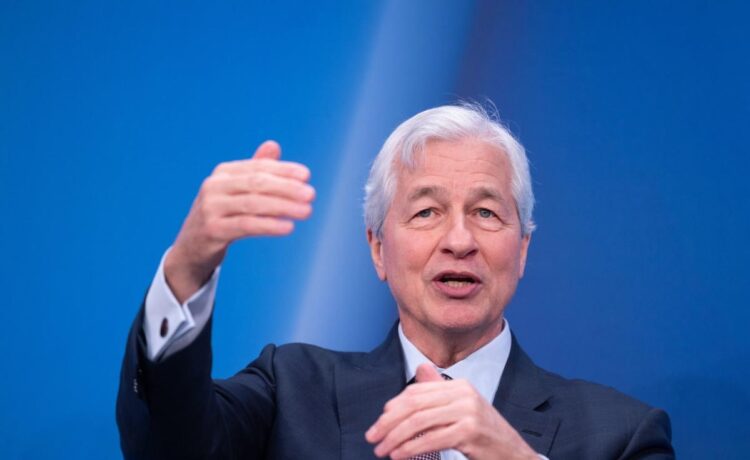(Bloomberg) — JPMorgan Chase & Co. Chief Executive Officer Jamie Dimon met with executives from the World Bank Group and several other multilateral development lenders as they seek to pull more private money into initiatives across emerging markets.
Most Read from Bloomberg
Dimon and the executives, including US International Development Finance Corp. chief Scott Nathan, discussed how to redirect private capital toward countries or issues often overlooked by investors and the need for more quality, development-focused projects to invest in.
They met in a closed-door lunch hosted by JPMorgan on Thursday on the sidelines of the International Monetary Fund and World Bank’s spring meetings in Washington.
The World Bank and other development lenders are striving to retain relevance as their capacities are far outstripped by the needs of poorer countries, particularly for capital-intensive climate-related projects.
That’s left them calling on the private sector to pour in more investments and on governments to pony up more capital, with both approaches so far yielding lackluster results.
The push also comes as the US and its partners seek to offer an alternative to development funding from China, now the biggest official creditor to emerging markets.
Read More: Biden’s Push for World Bank Funds to Compete With China Stalls
The topics Dimon and the lenders discussed included risk-sharing and increasing access to private debt markets through bond issuances, options that have been pushed by development banks to help support emerging economies around the world.
Rémy Rioux, head of the French Development Agency, said the meeting was the result of years of work trying to lure private investment, adding that this is the first time he can recall a bank executive as high-profile as Dimon attending such a gathering over the past two decades.
“That was the first time we reached Jamie Dimon,” Rioux said in an interview. “He was curious and trying to understand” each bank and their aims, he said.
Dimon has positioned JPMorgan at the core of the financial world’s responses to some of the most pressing recent geopolitical issues. In January, he met with Ukrainian President Volodymyr Zelenskiy in Davos as the leader aimed to bolster support for the war against Russia and plans for his country’s reconstruction.
JPMorgan counts development banks and multinational institutions — including the IMF and World Bank — among some of its most influential clients. In 2020, it launched a Development Finance Institution, billed as a way to expand private financing for sustainable development deals in emerging markets.
JPMorgan declined to comment.
“People are beginning to see this vast architecture of public financial institutions,” Rioux said, adding he has also spoken with Citigroup Inc. and other Wall Street institutions. “We are ready to host and to answer to this kind of interest.”
Rioux is also the chair of the Finance in Common Summit, a gathering of more than 500 multilateral, national and sub-national institutions with $23 trillion in assets. The group is looking to deepen coordination and integration at a summit later this year, which will be hosted by the Beijing-based Asian Infrastructure Investment Bank.
The World Bank on Sunday said in a statement that Hiroshi Matano, the head of its multilateral investment guarantee agency, and Makhtar Diop, the managing director of its International Finance Corp. arm, which lends to the private sector, attended the meeting. It said the meeting was an opportunity to engage on key trends in the global economy, as well as areas for collaboration between the development finance community and the private sector.
Most Read from Bloomberg Businessweek
©2024 Bloomberg L.P.

















